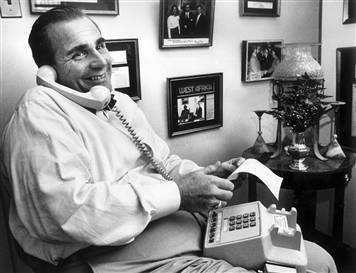
We will remember Edward von Kloberg III, who relished the presence of world leaders and was once singled out for "handling clients that no one else will touch."
--from the Washington Post
Tyrants' Lobbyist, Flamboyant to the End
Von Kloberg Dies After Years as an Image Shaper for the Reviled
By Adam Bernstein, Washington Post Staff Writer
Tuesday, May 3, 2005; Page A01
As part of Washington's image machinery for more than two decades, Edward von Kloberg III did his best to sanitize some of the late 20th century's most notorious dictators as they sought favors and approval from U.S. officials.
A legend of sorts in public relations circles, he counted as clients Saddam Hussein of Iraq; Samuel K. Doe of Liberia; Nicolae Ceausescu of Romania; the military regime in Burma; Guatemalan businessmen who supported the country's murderous, military-backed government; Mobutu Sese Seko of the former Zaire; and, in a figurative coup of his own, the man who overthrew Mobutu and renamed the country the Democratic Republic of the Congo.
Von Kloberg embraced the slogan "shame is for sissies" as well as an unabashedly Edwardian style of living. He arrived at balls and galas wearing black capes, and he traveled with steamer trunks. He added the "von" to his name because he thought it sounded distinguished.
In a life full of flamboyance, his end followed form: The District resident, 63, leapt to his death Sunday from "a castle in Rome," a State Department spokeswoman said. Von Kloberg's sister said a lengthy note was found on the body, and U.S. Embassy officials in Rome told her that he committed suicide.
Washington is a city of advocates and image enhancers, but only a few have staked their reputations as representatives of despots, dictators and human rights violators. For von Kloberg, the job was a social exercise as well as an all-consuming effort. As he wooed potential clients, he often highlighted his own bad press. There was a lot.
Epithets abounded. The authors of "Washington Babylon," a muckraking book about powerbrokers, wrote: "Even within the amoral world of Washington lobbying, [he] stands out for handling clients that no one else will touch." Washingtonian magazine once named him one of the city's top 50 "hired guns."
By far the most outrageous and lasting public impression of von Kloberg came from a notorious "sting" operation by Spy magazine. For a story the satirical journal titled "Washington's Most Shameless Lobbyist," a staff writer posed as a Nazi sympathizer whose causes included halting immigration to the "fatherland" and calling for the German annexation of Poland.
According to the magazine, von Kloberg expressed sympathy for the fake client -- and her $1 million offer. And then he was drubbed in print. Shortly afterward, he showed up at the opening of Spy's Washington office with a first-aid kit and sported a trench helmet, "so I can take the flak," he announced.
Friends of von Kloberg saw the article as a revolting caricature of a man whose grace and charm were displayed at intimate dinner parties he threw to unite disparate voices -- 3,500 dinners, each with 12 guests, he estimated.
At one gathering, he persuaded Nizar Hamdoon, Iraq's ambassador to the United States and the United Nations under Hussein, to meet Jews for the first time. He also brought together District residents, diplomats, socialites and journalists; many of the latter were fond of his famously accurate news tips.
His voice, said one friend, was marked by an "almost Rooseveltian, high-class accent." He drove enormous black cars and draped foreign medals (Zaire's Order of the Leopard among them) across his tuxedo. At night, he sported one of two favorite black capes: one with red lining, the other with prints of doves.
As was said of the Bloomsbury diarist Violet Trefusis, a writer he admired, von Kloberg had a "taste for outmoded splendors." He believed such flourishes were essential to conducting business with world leaders, the kings and presidents for life whose presence he relished. When they listened to his advice, it was "very invigorating," he said.
Read more, dahlings! http://www.washingtonpost.com/wp-dyn/content/article/2005/05/02/AR2005050201380_2.html











No comments:
Post a Comment